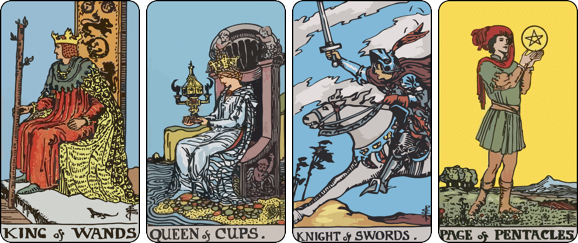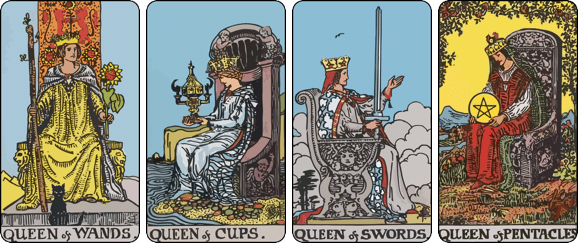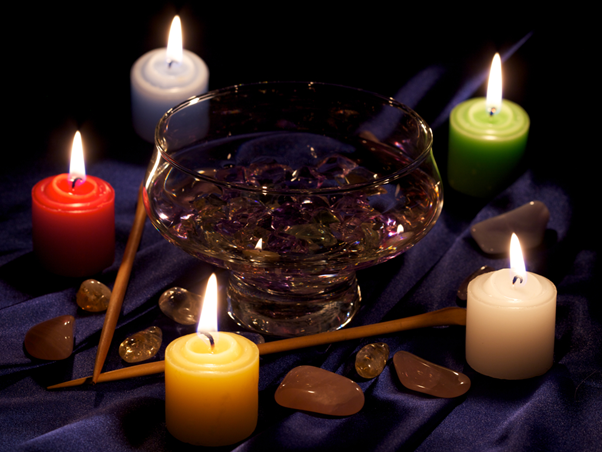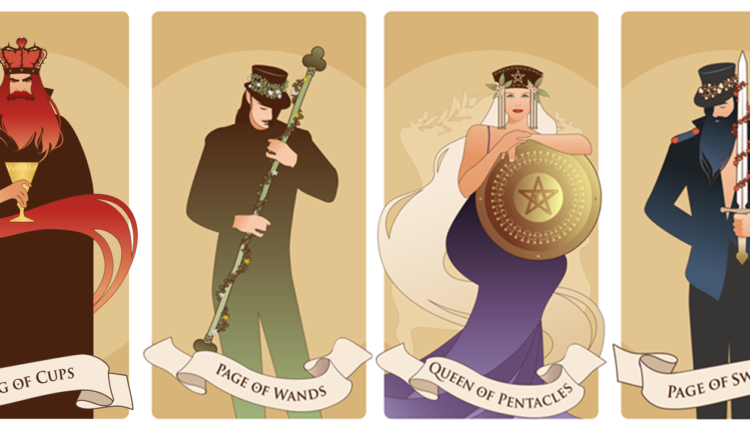Four ways to interpret Tarot Court cards
Menu of Contents
The four levels of Tarot Court cards
The level of each deck is different, from Major cards to Minor ones. In this article, we will use the common standard of four suits: King – Queen – Knight – Page.

The King Tarot Court cards
King describes the Yang aspect (in Yin-Yang concept) of a truly mature person, this is the masculine energy source. He shows himself to be a person of society, he masters what he knows in public and is a veteran expert in his field. He is an icon of power, a leader, a manager, a prime minister and a man who always obeys the rules. He makes decisions and executes tasks. In many ways, he also has a resemblance to the Emperor in the Major Arcana, he focuses on and limits his Minor Arcana more.
<<< See More >>> 16 MBTI Personality Types In Tarot Court Cards
When you get a King card, ask yourself how to express your dominance/control/maturity/cohesion, whether you are capable, whether you are suppressing yourself, whether you are doing everything right or not.
King usually denotes the following:
- Competence;
- Ability;
- Power and leadership;
- Authority;
- Respect;
- Making decisions.
The Queen Tarot Court cards
Queen depicts the Yin aspect of a truly mature person, this is a feminine energy source. She shows what is within her and at the same time, she is also an expert in her field. She is guided by persuasion, intuitively, nurturing and encouraging others. She is an aspect of the Empress, she is expressing insight and creativity through the energy of her Minor Arcana.

When you get a Queen card, ask yourself how you can express the qualities of yourself and others as well, whether you are aware of your sophistication, how you can nurture it, what are you helping others to form.
Queen often denotes the following:
- Understanding;
- Convince;
- Communication;
- Teaching;
- Nourishment;
- Emotional awareness;
- Creation;
- Intuition;
- Leadership through consensus.
The Knight Tarot Court cards
Knight describes the Yang aspect of a young person, this is a masculine energy source. He lacks the far-sighted vision of the King but turns it into his absolute energy source. He can be violently led. He always seeks to revolutionize and change something. He is a reckless adventurer, a daredevil, a romantic and an idealist. His nature is movement. He understands the lessons about his Minor Arcana even though it is really difficult, he puts all his soul into it.
When you get a Knight, ask yourself what is your ideal? What is haunting you? What goals and rewards can you achieve? Do you know what I want? Are you cruel? Do you focus?
Knight often denotes the following:
- Energy;
- Passion;
- Motivation towards a goal;
- Purpose;
- Concentrate;
- Putting the whole mind to something;
- Idealism;
- Vitality;
- Thirst for life.
The Page Tarot Court cards
Page denotes the Yin energy source of a young person. She is open, eager to learn, passionate about exploring, innocent and ready to grow up. Page loves life, takes it, immerses herself in the nature of the Minor Arcana, lives without complicating anything. Page can also be a newcomer in your life who will bring you messages and opportunities.

When you get a Page card, ask yourself whether you are ready to hear that message, are you eager to learn? Do you open your heart to the emotions of your inner dreams?
Page often denotes the following:
- Curiosity;
- Hope;
- Innocence;
- Openness;
- Faith;
- New beginnings;
- Novelty;
- Evolution;
- Learning and practicing.
Four ways to interpret Tarot Court cards
Court cards are often the most complicated and confusing cards. Because there are many ways to explain them in the spread, such as human, personality, circumstance, etc.
This article will teach you different ways to interpret the Court cards, at the same time, share some tips for using those methods at the right time.
1. Tarot Court cards represent human
Court cards often represent a person. That person maybe yourself or another person. Once you understand the personalities and attributes of cards, you can determine who they refer to. Court cards mainly reflect personalities and characteristics. They show the source of a person’s thoughts, feelings, and motivations.
Court cards are often linked to the Myer-Briggs personality test (MBTI). Myer-Briggs is based on Carl Jung’s theory and ideas and is a prestigious method of gaining a deeper understanding of personalities and motivation. MBTI test offers 16 different personality types, and interestingly, these personalities correspond to the 16 Court cards in Tarot.
If you have ever done the MBTI test, you could draw your own conclusions about grouping Court cards with MBTI’s personality types and writing them in your Tarot notebook. At this stage, there is no consistent system between 16 Royal cards and 16 MBTI personality groups.
In traditional Tarot books, Court cards also have physical characteristics such as hair color or eye color, gender or age (for example, men, brown hair, blue eyes, attracts and matures, etc.). However, this is quite limited and often inaccurate according to many readers. For example, Queens can represent a man, Kings represents women and Page represents the elderly as well, etc.
2. Tarot Court cards are a part of yourself
Sometimes, Court cards can refer to a part of yourself, instead of the whole personality. That may be a part you often express or the part you need to nurture for and develop.
For example, if you receive the Page of Swords Tarot card in the spread about career, you may need to apply your way of thinking more curiously to achieve success. Or if you are curious enough, its appearance confirms that you have done everything you need.
3. Tarot Court cards represent situations/events
However, there are times when Court cards do not represent a person or part of their character. Therefore, sometimes Court cards may present a situation or event which is personal.
For example, the appearance of the Page of Cups Tarot often refers to an invitation or an offer that will bring a lot of joy and excitement. Or the King of Wands shows a situation where goals and visions in your life are gradually reaching the ripe time.
4. Tarot Court cards represent maturity
Besides interpreting based on human, personalities or situations, Court cards also show different levels of maturity.
From a personal perspective, maturity can refer to a person’s age but is usually more profound when considering maturity as a way of thinking.
For example, Page cards are often considered a young and immature person, not necessarily under 21 years of age, but can refer to a person with a young, naive, or inexperienced soul in a specific case.
Maturity levels can also refer to different stages of a journey. Page cards represent the beginning of the trip, King cards show the conclusion and perfect it with life lessons and deep insight.
How to use interpretations of Tarot Court cards at the right time

With so many diverse interpretations of Tarot Court cards, learners have encountered many difficulties. Here are a few tips to know how to use those interpretations at the right time:
- Before spreading, determine whether you want Court cards to represent human, personality or circumstance.
- Use your intuition and listen to your inner voice to guide you in the right direction;
- List ways of interpreting these cards according to human, personality, or circumstance. Then, choose the most appropriate interpretation for the spread.

